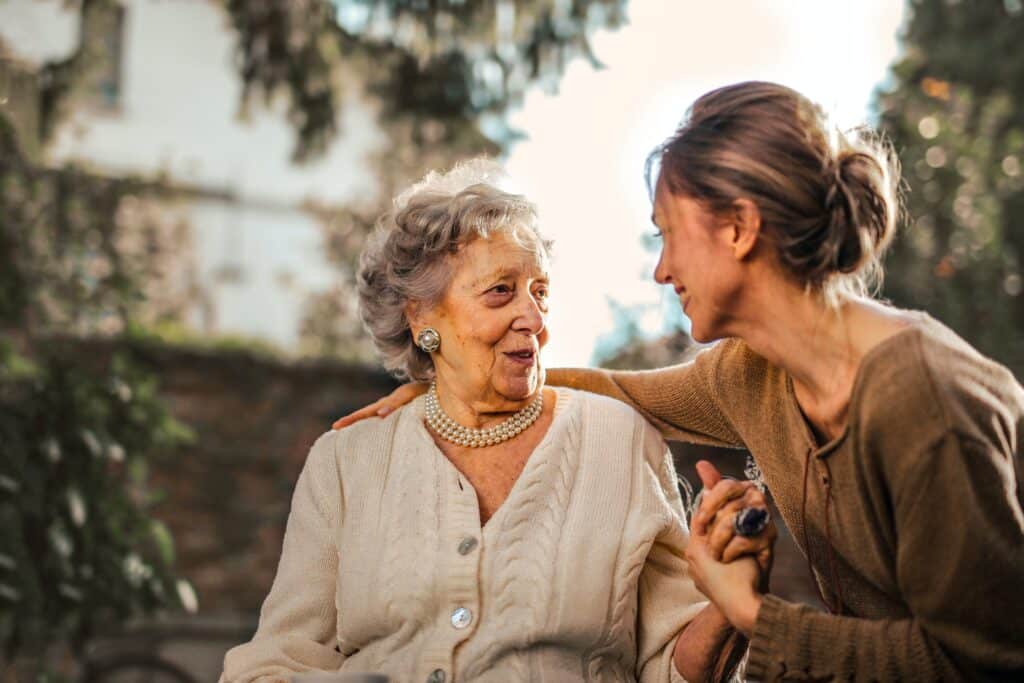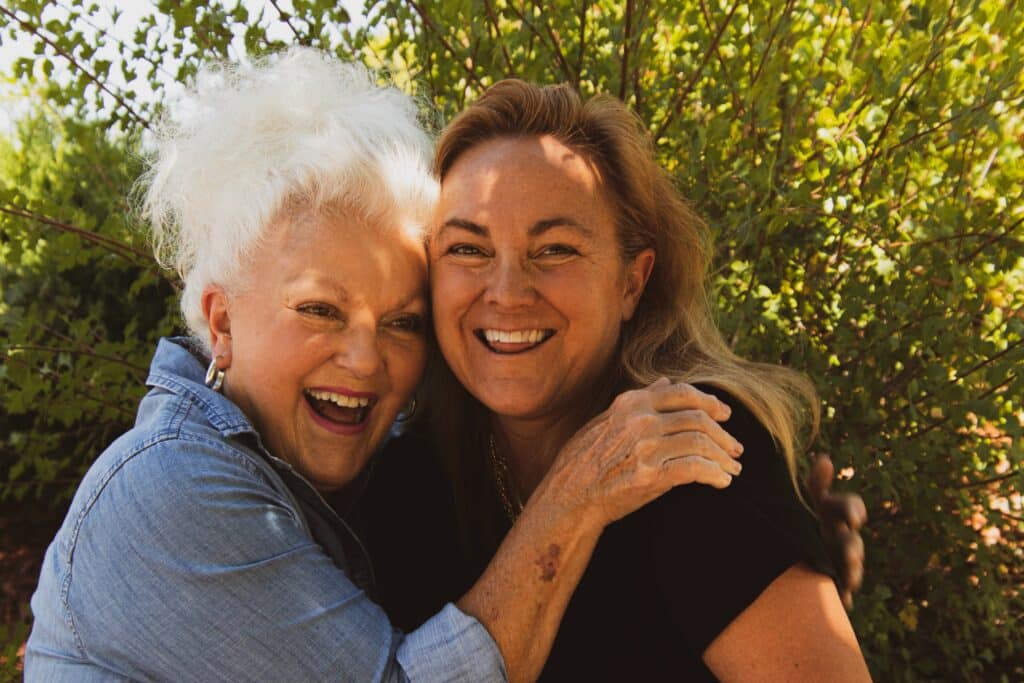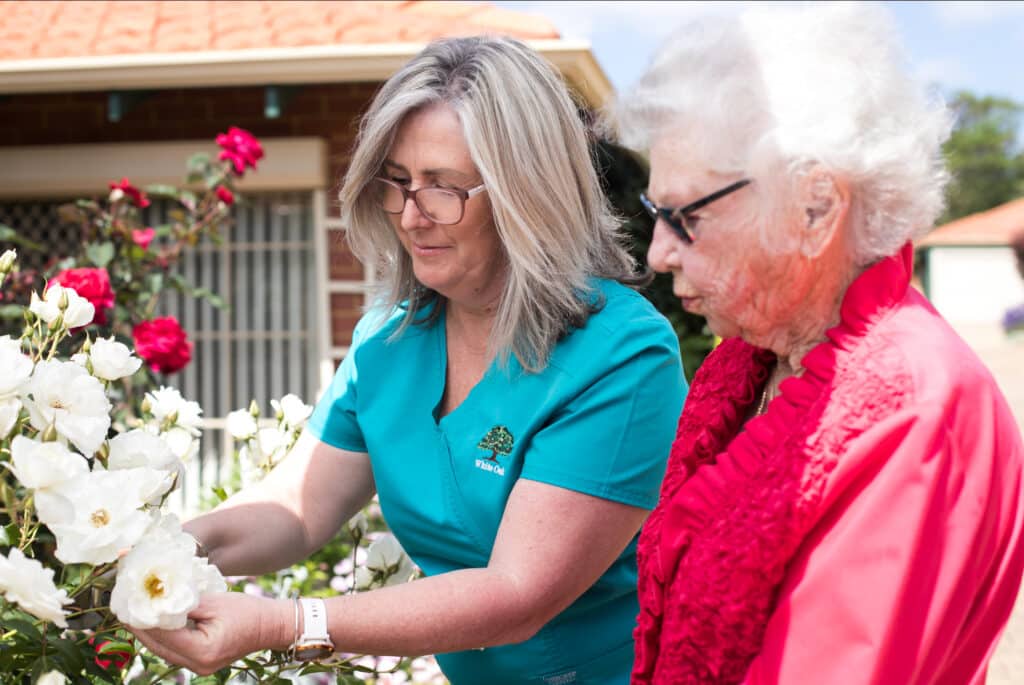Discover some of the warning signs of anxiety and depression amongst seniors to help support, empower, and assist your elderly loved ones.
Coping Strategies for Family Caregivers of Seniors with Dementia or Alzheimer’s
The duty of caring for someone, especially in an aged care setting, requires both physical stamina and emotional fortitude. When that care is directed towards a senior loved one living with dementia or Alzheimer’s, it requires even more resilience and having effective coping strategies for dealing with the emotional and physical challenges is essential.
In this blog, we’ll explore some helpful ways to improve carers’ coping capability.
Understanding what dementia and Alzheimer’s is
It can be empowering and helpful as a family caregiver to know as much as possible about the disease your loved one is experiencing. The more you know, the better prepared you’ll be to face the challenges with confidence and empathy.
Dementia
- Dementia is the broad term used in relation to a range of symptoms that affect an individual’s cognitive ability.
- Dementia can degrade one’s memory, thinking and reasoning ability and can become progressively worse over time. Ultimately, it can cause a complete loss of language/communication, impaired judgement and significant changes in behaviour.
- Seniors suffering from dementia may require varying levels of care services and support as the symptoms can vary (and change) in intensity.
If you’d like to find out more about Dementia Care and support services, head to dementia.org.au.
Alzheimer’s
- Alzheimer’s disease is a cause of the symptoms associated with dementia and is statistically the most common cause. This degenerative brain disorder is caused by the gradual loss of brain cells, a process which is unfortunately irreversible.
- As with dementia, Alzheimer’s can significantly impact one’s daily life as it causes progressive declines in memory, cognition and reasoning.
- It is not known what the exact cause of Alzheimer’s disease is, though there are theories that factors such as genetics, lifestyle and environmental factors could be contributing elements.
- There is currently no known cure for Alzheimer’s and care services are focused on improving the quality of life for seniors whilst ensuring simultaneous symptom management.
- If you’d like to learn more about Alzheimers’s and the support services available, click here.
Seek support and help
Perhaps the most important coping strategy for family caregivers is to ensure that you seek support and help when you need it. Family and friends of your loved ones are often more than willing to provide help and support where possible, and you should not be hesitant to ask for it, so, don’t be shy to ask your or your family member’s healthcare providers for help as well. If you are caring for someone with dementia or Alzheimer’s and are not sure how to get the care services you need, make sure to reach out to our team at White Oak or visit Services Australia.
Take care of your own health
We mean it when we say that taking care of yourself is critical to taking care of your loved one. If you’re unable to prioritise your own health and well-being, then your ability to take care of a senior in your family over the long term will be compromised. Much like putting on your oxygen mask before helping others, taking care of your health is a necessary first step.
Diet
Make sure to eat well and maintain a balanced and nutritious diet for yourself and your family members with dementia.
Exercise
Keeping yourself physically fit is important for not just your strength, but for boosting your mood and energy and taking care of an individual with dementia or Alzheimer’s can be exhausting, so regular physical exercise will help you in more ways than one.
Sleep
Much like diet and exercise, maintaining a consistent sleep schedule of 7 to 9 hours a night will contribute significantly to your physical and mental health.
Stress Management
Being a family caregiver is stressful and managing that stress for everyone’s emotional wellbeing is important. Some ways you may be able to manage your stress levels include:
- Mindfulness or meditation
- Deep breathing exercises
- Spending time doing something you love or a hobby
- Spending time socialising
- Giving yourself ‘me-time’
Social Connections
Positive social connections are important for you and the senior you’re taking care of. In addition to adding a sense of belonging to your everyday experience, it will help you extend your support network and possibly even connect with individuals going through similar experiences and be able to offer support. Purely social interactions are also important and can reduce feelings of isolation or loneliness.
Be Patient
Remember that dementia and Alzheimer’s disease can cause you to feel frustrated, stressed, irritated and overwhelmed. All of these feelings are normal and understandable. Instead of trying to ignore such feelings, accept them and allow yourself to feel that way. Remember to be patient with your loved ones themselves who are similarly experiencing a very disoriented and difficult period of their lives.
Prioritise Meaningful Activities
Seeking out meaningful activities to engage in for both the caregiver and the individual with dementia can improve quality of life, and overall happiness and increase feelings of wellbeing. Even during difficult and overwhelming periods, it can be easier to cope with life’s tribulations when one feels like there is meaning infused in one’s daily routine.
Simplify Tasks
When you simplify the tasks in front of you, your daily routines will seem more manageable, less stressful and easier to cope with in general.
- Create a daily to-do list.
- Stick to a schedule that works for you
- Prioritise the most important tasks and break them down into manageable steps
- Designate times for specific activities
- Delegate and seek support/help wherever possible
- Declutter your life physically and in terms of your schedule
- Simplify decision-making by establishing clear guidelines
Plan for the Future
Life with someone with Alzheimer’s or dementia can be unpredictable. That’s why it’s even more critical that you make arrangements wherever possible for the future.
These irreversible diseases progress at varying rates, so ensuring you have a plan in place can ease stress today, tomorrow and for many days afterwards.
Consider the following:
- Long-term care planning
- Financial planning and legal arrangements
- Home and travel safety arrangements
- Emergency contacts
- Support networks
- Healthcare providers and care planning
- Respite opportunities and self-care
White Oak is here to support you and your loved one
Even with all the coping tips and tricks in the book, caring for a loved one with dementia or Alzheimer’s can be tough. Luckily, with White Oak, you never have to do it alone.
We’re here to assist you and the senior(s) in your life to ensure that everyone gets the support and care they deserve. If you’d like to find out more about our affordable care services and packages or are just looking for some assistance in finding the support you need, make sure to contact the White Oak team today.





